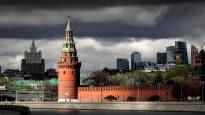Official Russia reiterated its warning about Finland’s NATO membership, but there was little new in the comments. The NATO path in Finland and Sweden also tells of the failure of the Kremlin’s own strategy, writes foreign journalist Heikki Heiskanen.
As expected, the NATO positions of the Finnish leadership were not in Russia’s mind.
President Vladimir Putin press secretary Dmitry Peskov considered that Finland’s NATO aspirations threatened Russia.
– Absolutely, Peskov replied when a reporter asked him about it in a conference call.
“NATO’s new enlargement will not make our continent more stable and secure,” Peskov said.
The Russian Foreign Ministry, for its part, announced that Finland’s accession to NATO would cause serious damage to bilateral relations and to the stability and security of Northern Europe.
Russia has stated these positions several times before.
Peskov was also asked whether the accession of other neighboring countries to NATO would be linked to Russia’s “special operation”, ie the war in Ukraine.
– We always look at and analyze different options, Peskov said.
Peskov’s meager wording says that the issue is embarrassing for the Russian administration.
If the Kremlin really intended to halt NATO enlargement, the strategy failed badly.
Russia’s own actions – the stern diplomacy at the turn of the year and the invasion of Ukraine that began in February – now seem to lead to the exact opposite result: Russia is getting two new NATO countries into its neighborhood.
Therefore, the Russian leadership may not have a particular need to raise the profile of the issue.
The hustle and bustle of Russia’s thriving propaganda sites on the Internet may intensify in the future.
Countermeasures have still not been identified
Peskov said that Russia was analyzing what actions it would take after Finland’s accession to NATO. He recalled that President Putin had previously given a mandate to list ways to strengthen the security of the country’s western wing.
According to Peskov, it all depends on how NATO enlargement develops and how close military infrastructure is brought to Russia’s borders.
The Russian leadership has not officially identified what the military-technical measures could be.
Former President and Prime Minister of Russia Dmitry Medvedev has warned that Russia could respond to NATO and Swedish membership of NATO by bringing nuclear weapons and hypersonic missiles to Kaliningrad, ie missiles flying at multiple speeds of sound.
Medvedev, who previously maintained a relatively liberal public image, has profiled himself during the war as one of Russia’s political haunts.
This may indicate Medvedev’s need to raise his own profile. His career in Russian leadership has been declining since he held the presidency for one term before Putin returned to power.
Vesti: The United States persuaded Finland and Sweden to join NATO
Russia’s power public is now looking for a way to deal with Finland’s and Sweden’s NATO efforts.
At the heart of the matter is the implication that the active factor is the United States.
Not a word is said about the effects of Russia’s own actions – such as the war against Ukraine – on the decisions of Finland and Sweden.
The story goes that the United States needs new member states mainly to bear the cost of a military alliance and to support the U.S. military industry.
– Washington has long complained that in the face of the appalling US budget deficit, it is the European countries that need to maintain the alliance and secure the American military industrial complex with orders, Anton Dadykin says.
According to Vest’s reporter, Finland and Sweden did not join NATO for practical reasons so as not to have to increase their military spending.
– Now the United States leaves no room for retreat. Helsinki and Stockholm were not even allowed to hold referendums.
Interpretations of history are brought to the rescue
Vesti relied on the “Nazi card” currently favored by the Russian leadership.
– Now Helsinki and Stockholm do not like to remember how actively they helped Hitler. Only thanks to the Finns were the Nazis able to organize the siege of Leningrad. The leader of the Third Reich greatly appreciated the Commander-in-Chief of Finland, the Marshal Carl Mannerheimiathe reporter says in his story.
The story thus recalls Finland’s alliance with Nazi Germany in the Continuation War of 1941–1944. The Soviet invasion of Finland during the Winter War of 1939–1940 is not mentioned.
Russia has recently used the Nazi stamp frequently, and not just in its anti-Ukrainian propaganda. Recently, posters were seen at Moscow bus stops naming well-known Swedes as Nazis.
Vesti also says that after the break-up of the Soviet Union, Finland and Sweden were almost “united” to NATO and took part in joint military exercises.
At the same time, this suggests that the countries were on the NATO road a long time ago – before the Russian war in Ukraine.
